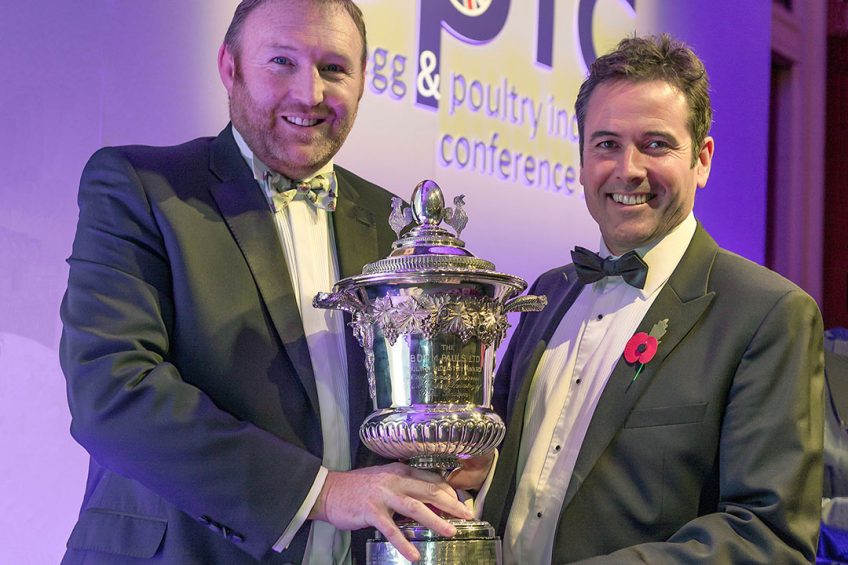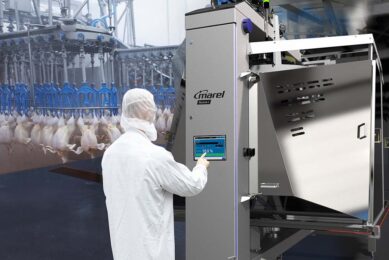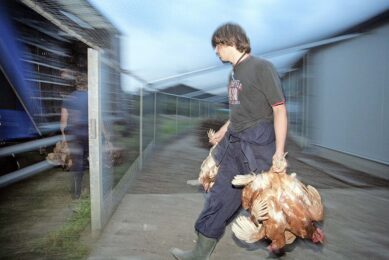Brexit people problems forcing more automation

Two of the poultry industry’s biggest players are investing heavily in automation to mitigate the loss of labour availability.
Both Dale Burnett, Noble Foods chief executive, and PD Hook Hatcheries’ James Hook told delegates at the Egg and Poultry Industry Conference that consolidation and automation would be the response to a shrinking workforce.
Mr Burnett said Noble was investing £100m to improve automation across its business. He revealed that 60% of the business’s workforce was from overseas, and of those, almost half had said they expect to return home within the next 5 years.
“I have no confidence that the labour market will improve,” he added.
Noble Foods’ premium dessert business GÜ was one example, Mr Burnett said, with a new £25m factory reducing the need for people, but a third of its output was exported to Europe.
“As of today, I’m unclear as to whether import tariffs will effect that business or not. If it does, we will have to dig even deeper and build a factory in Europe so we can continue to serve that market.”
Windows still a sticking point for northern producers Broiler farmers in the north of England and Scotland are feeling still feeling “left out” by new Red Tractor standards that require windows to be installed at the equivalent of 3% of floor space. Mr Hook said producers – many of whom had windows at 1% of floor space – resented the new standard, as well as the cost of upgrading. He added many of the poultry houses were narrower than those in the south, meaning light levels were broadly the same, and that colder temperatures meant windows at 3% would see heat ‘pouring out’. “I would love to see the farming community unite and come together as one over this.” |
On the broader egg sector, Mr Burnett said he felt that consolidation would help shore up the sector, and improve prices. “I think that there needs to be further consolidation in the industry, oversupply leads to lower prices, and unsustainable prices for farmers.”
And smaller businesses should look to expand and find economies of scale through partnerships. “It’s difficult to invest in massive amounts of technology when you’re small, so look to find partners you can work with and form alliances that make you stronger.”
Mr Hook said his business had closed smaller facilities and farms, and had invested in machinery like hatchery separators and egg packers to reduce the reliance on staff. The uncertainty Brexit brought had also halted plans for expansion.
Public funds for higher welfare Egg and poultry producers could qualify for taxpayer support after Brexit to help improve bird welfare, Defra minster George Eustice suggested. “The inclusion of animal health and welfare as a public good which we are willing to commit public money to, is something which offers a lot of interesting and exciting prospects for the poultry industry,” he said. Mr Eustice acknowledged that the poultry sector was self-reliant and operated well without subsidies. “But if the intervention of public money can help promote higher standards of animal welfare, we stand ready to do so.” The government would be running a series of pilots over the next few years to explore this further. |
“For 2 years labour availability has got slowly worse. We’ve got various planning permissions in our business still sitting there unbuilt, plans of quite substantial scale. We’ve had 2 years now of stagnation and I’m pretty desperate to get going again.”
He added that employees were less prepared to work weekends, and delivery drivers were also becoming increasingly sparse, compounding problems.
Govt fails to make trade guarantee Defra farm minister George Eustice has said it would be wrong to open UK markets up to foreign food produced to lower standards post-Brexit – but failed to provide a guarantee that this would not happen. Addressing the Egg and Poultry Industry Conference in South Wales, Mr Eustice said he and fellow ministers at the Department for International Trade “are crystal clear that we will not water down our animal welfare and our food standards in pursuit of a trade deal”. “There is no doubt that some other countries that want access to our market will request that, but we do not need to accept that.” But, when pressed further on the issue of allowing US chlorinated chicken in, Mr Eustice said that it was all a question of “equivalence” of standards, rather than having an identical rule book. “In trade negotiations it is possible to recognise equivalence,” he said. “Your regulations may not be written identically, word for word, in a way that it obviously is in the European Union. But in all our future trade deals, we will be arguing for a recognition of equivalence. “The basic principle should be that, if you are seeking to do business with another country, you should respect the rules and customs of the country you want to do business with.” NFU president Minette Batters accused the minister of “dodging the bullet” by refusing to guarantee that imports would not be allowed in if they were produced to standards which would be illegal in the UK. |
Join 31,000+ subscribers
Subscribe to our newsletter to stay updated about all the need-to-know content in the poultry sector, three times a week. Beheer
Beheer











 WP Admin
WP Admin  Bewerk bericht
Bewerk bericht